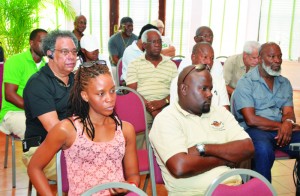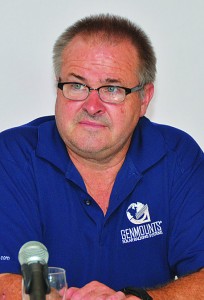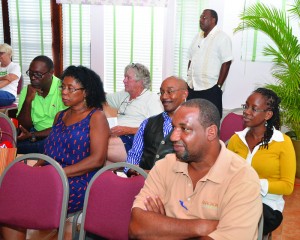
“What is Anguilla waiting for?” an alternative energy expert asked when he met with a group of Go Solar enthusiasts at Paradise Cove several days ago.
He is Mr Mike Strizki, of New Jersey, who also describes himself as an inventor, scientist and engineer. He heads his own company – Renewable Energy International – which is involved in solar hydrogen systems and also operates a non-profit organisation called Hydrogen House Project which is in pursuit of clean and renewable solutions to help meet the world’s increasing energy demands.He was invited to Anguilla to share his knowledge and experience of alternative energy.

Noting that hydrogen fuels the sun, and that his project converts solar energy into hydrogen cells to produce clean electricity, Mr Strizkiwas emphatic in his presentation. “God has placed a nuclear ball in the sky called the sun, so why does Anguilla import fuel when it can turn to solar energy to meet its electricity needs?” he asked, saying that a 15- megawatt solar system can supply all the power the island needs.
One of Anguilla’s Go Solar enthusiasts, who said that Mr Strizki had already introduced his project to StKitts-Nevis, Cayman Islands, Bermuda and other islands, spoke to The Anguillian about Mr Strizki’s visit to Anguilla: “He came to tell us the things that some of us already know,” the spokesman stated. “We would like the rest of the island, as well as the Legislature and the Government, to know that we have to take action now if we are going to stand a chance tomorrow. Our energy cost is too high, unsustainable and is hurting businesses and individuals.

“The story is that at least there are 800 electricity disconnections on the island. Whatever the actual figure is, it is a significant number and something has to be done. We cannot continue to pretend that we don’t have a crisis. The sad thing about it is that the solution is staring us in the face everyday when the sun comes up, but we are resisting what needs to be done. We are throwing stumbling block in the way and not simply rolling out facilitative actions that would allow this thing to happen.”
Interrupting the Go Solar spokesman, Mr Strizki commented: “It is like having the cure for disease but basically saying we are going to treat it forever and will let the patient die. It is absolutely crazy what I am seeing happening here because it defies logic; it defies common sense and it defies the financial interest of all the businesses and the people of the island.”
Asked to explain what steps Anguilla can take towards the achievement of solar energy, Mr Strizkireplied: “There are several different pathways and all of them have to be used right now. The primary pathway is to put a large enough solar system on the island to circumvent 95 percent of diesel cost so you plug the hole in the bucket immediately. You allow people on the island to interconnect with their own solar energy systems; you allow for virtual net-metering; and you put solar equipment on all the public buildings. So when there are off-seasons and business is bad, the cost of energy is low enough that the businesses and the people can be sustained.
“By doing this, people will have jobs to install solar equipment and the money will be kept from leaving the island. If the money stays in circulation in the local economy, it will create more jobs, more opportunities and more wealth for the people. This is a win-win situation. All you will be buying is the equipment. The energy is free from the sun everyday and you are in a place in the world where you get more of that free energy than anyone else. God has blessed you with that gift so why would you want oil from Saudi Arabia?”
The Anguillian Go Solar enthusiast, speaking with Mr Strizki in the newspaper interview, was asked how such a project would fit in with the operations of ANGLEC. “I think the Ministry and the Government will have to set the pace, tone and policy in place,” he responded. “We must first have an energy policy that leads us towards energy independence – so the legislation needs to be changed to allow for grid-tie, to interconnect with alternative energy.
“Once that policy is put in place, then ANGLEC has to follow suit. The fear that ANGLEC will go out of business is ridiculous. ANGLEC is a monopoly – the only electricity company we will ever have. They will not go out of business. This may be a way for them to make more profits. Their dollar revenue may drop, but their profit margin may in fact increase if they do this right.
“Irrespective of what happens to ANGLEC, this country does not have an option. We can generate electricity for less money, using alternative means, than we can generate with diesel – so why are we continuing to generate electricity with diesel? What the Government can do to help us, is to remove the tariffs on the importation of alternative energy equipment. That means solar panels will be duty-free; batteries and all other systems will be duty-free; and electricity cars should be zero duty so that we can start to bring them to this island. We can then stop bringing in diesel and gasoline cars and stop sending our money overseas to pay for the running of these cars forever…
“The twenty million dollars that we are sending overseas to buy diesel, would be twenty million dollars more in our economy. If that money stays on the island, it will spread around to all of us; but if it goes to Saudi Arabia or Venezuela, we will never see it again.”







